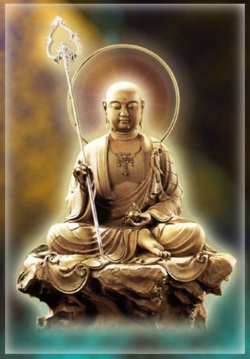Upasaka and Upasika
Buddhist lay men are called upāsaka and lay women upāsikā. Both words are derived from 'to sit close' (upāsati) and 'to attend to' (upāsana). Lay men and women make up half the fourfold assembly (catuparisā) of the Buddhist community, the other half being monks (bhikkhū) and nuns (bhikkhunī). Upasaka/Upasika; Buddhist lay disciple (man/woman), who formally received five precepts or rules of conduct.
The Buddha said that to be a lay Buddhist one has to have taken the Triple Refuge and sincerely practise the five Precepts (A.IV.222). This of course is the bare minimum. The Buddha expected the highest ethical, intellectual and spiritual aspirations from all his disciples. The Dhamma was meant for all, it can be realized by all and therefore it should be practised by all. The Buddha said: "Whether in a householder or a monastic I praise right practice. And whether they be a householder or a monastic, if they practise in the right way, then because of their right practice they will be winners of the Truth, the Dhamma, the Skilful" (S.V,19). Some lay people today believe that it is sufficient for them to just worship the Buddha or other worthy persons. The Buddha would have agreed with this but his idea of what constitutes truly meaningful worship was in a different category from bowing, putting the hands in a praying gesture and placing flowers on shrines. He said: "The monk or the nun, the lay-man or lay-woman who lives by the Dhamma and perfectly fulfils it, it is they who honour me with the highest reverence" (D.II,138).
One of the lay person's most important duties is to provide the basic necessities, the four requisites, to monks and nuns. The Buddha envisaged the ideal relationship between his lay and monastic disciples as being symbiotic - lay people providing monastics with their material needs and monastics providing lay people with spiritual guidance and example. But the Buddha was aware that if lay people remain content with being simply a provision shop for monks and nuns, that the Buddhist community would be severely imbalanced and incomplete. Thus he admonished his lay disciples: "You must not be satisfied with the thought, 'We have given the Saṅgha the requisites" (A.III,206). Some of the other things that the Buddha expected of his sincere lay disciples includes doing good works, having integrity in their business dealings, being a true friend to others (D.III,188), visiting and comforting the sick (S.V,408), going on meditation retreats from time to time (S.V,19), in short, practising The Noble Eightfold Middle Path in all its depth and breadth.
But of course one can only practise the Buddha's teaching if one knows it and therefore the Buddha also expected his lay disciples to be well-versed in the Dhamma. He said: "I shall not pass into final Nibbana until the lay-men and lay-women are accomplished and well-trained, learned and erudite, knowers of the Dhamma, living by Dhamma and walking the path of Dhamma, not until they pass on to others what they have received from their Teacher and teach it, proclaim it, establish it, explain it, promote it and clarify it, not until they are able to use it to refute false teachings and impart this wondrous Dhamma" (D.II,105).
Enlightenment as a lay person
Some non-Buddhists or non-Theravadins incorrectly believe that lay Theravadins believe that enlightenment is not possible, that enlightenment can only be obtained by monastic monks and nuns. But the fact is that Theravadins do believe that lay disciples can become fully enlightened. As Bhikkhu Bodhi notes, "The Suttas and commentaries do record a few cases of lay disciples attaining the final goal of Nibbana. However, such disciples either attain Arahantship on the brink of death or enter the monastic order soon after their attainment. They do not continue to dwell at home as Arahant householders, for dwelling at home is incompatible with the state of one who has severed all craving." One may be a householder all the way up to becoming an Arahant, it just that after that (full) enlightenment is attained, the person will apparently want or need to ordain. There is no need to feel defeated or to not try, there is the opportunity for full enlightenment, even as a lay follower.
Some examples from the Pali Canon of enlightened lay people
Yasa attained arahantship while being a layman, but he, too, entered the Order immediately afterwards (Vin.I.15-20). Khemā, chief of the Buddha's women disciples, attained arahantship before she entered the Order, but she entered the Order with the consent of her husband Bimbisāra, probably on the same day (ThigA.126f).
Suddhodana, the father of the Buddha, attained arahantship a little while before his death (DPPN. s.v. Suddhodana). The Mahāvamsa (chap. xvi, 10-11) records that fifty-five brothers headed by the chief minister Mahā Arittha attained arahantship in the tonsure hall, while their heads were being shaved prior to being admitted into the Order.
In the Kathavatthu (157-8) the question whether a layman can become an arahant is discussed. The point maintained in it is that what matters is not the external characteristics of a recluse or a layman, and that anybody who is free from the mental fetters and lives a life of complete renunciation could attain arahantship. King Milinda, too, maintains this view and quotes the following words of the Buddha: "I would magnify, o brethren, the supreme attainment either in a layman or in a recluse. Whether he be a layman, o brethren, or a recluse, the man who has reached the supreme attainment shall overcome all the difficulties inherent therein, shall win his way even to the excellent condition of arahantship" (Man. trsl., SBE. vol.36, p.56), but so far this statement has not been traced in the Tipitaka.
In the Milindapañha (ibid. p.57) again, a question is posed as to why a person should enter the Order if laymen, too, could attain arahantship. In reply it is shown that facilities and opportunities for cultivating the mind are greater if one enters the Order, since monks are not bound up with duties of laymen such as earning to maintain oneself, wife and children and looking after the needs of relatives. In the Subha Sutra (M.II.197) the Buddha says that a person, whether he be a layman or a recluse, who leads a virtuous life, ever striving to cleanse the mind of impurities, would progress in the path to liberation.
There is a current belief among some Buddhists that when a layman attains arahantship he should enter the Order the same day or within seven days or else he would die in one to seven days. Nagasena, too, confirms this view. It is difficult to trace from canonical sources any evidence to substantiate this view. Apparently this is found in the Commentaries, but not in the Pali Canon. But as Bhikkhu Bodhi notes above, it is probably something that just occurs (ordination) simply because there is no longer the attachment to the worldly mundane life.
Again, if we examine the connotation of the word anāgāmī (non-returner to the material world) we obtain more evidence to support the view that arahantship is attainable outside the Order of monks. If an anāgāmī does not attain arahantship in that very existence, he will pass away and will be reborn among the Suddhāvāsā deities, where he will put an end to reiterated existence. <poem>


